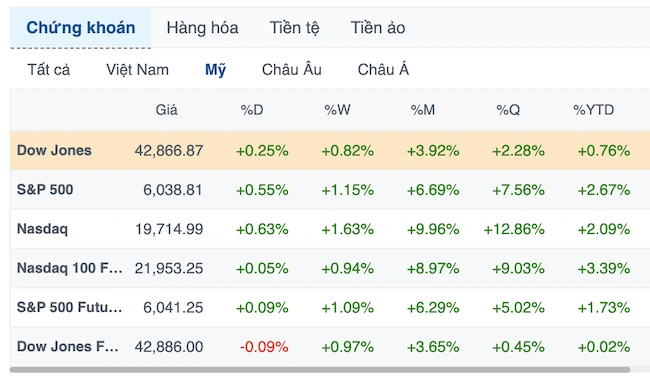Market on June 13: Oil slightly down, gold hits a one-week high, Indian rice at a two-year low.
At the close of trading on June 12, 2025, oil prices fell slightly as the market monitored tensions in the Middle East. Gold prices reached a one-week high due to geopolitical tensions and expectations of the Fed cutting interest rates.
Wall Street rose thanks to a 13% jump in Oracle's stock.
U.S. stocks rose on Thursday (June 12), thanks to the upward trend of Oracle shares boosting investors' hopes and the technology sector.

At the end of the trading session on June 12, the S&P 500 index rose by 0.38% to 6,045.26 points. This index is currently less than 2% below its record high. The S&P 500 increased by 0.24% to 19,662.48 points. The Dow Jones index rose by 101.85 points (equivalent to 0.24%) to 42,967.62 points.
U.S. stocks rose after Oracle reported better-than-expected fiscal Q4 earnings, with cloud revenue projected to increase by more than 70% in fiscal year 2026 due to AI demand. Oracle's shares rose 13%, boosting the tech sector and the S&P 500 index. In contrast, Boeing's shares fell nearly 5% following the incident involving Air India's Dreamliner 787.
Additionally, the PPI index in May only increased by 0.1%, lower than expected, indicating stable inflation and helping bond yields to decrease. However, the threat of unilateral tariffs from President Trump has made the market cautious. The U.S. and China have reached a new framework for negotiations in London, but are still awaiting approval from the leaders of both countries. Both sides agreed to loosen some restrictions on rare earth elements and international students.
Oil prices have slightly decreased.
Oil prices fell after rising more than 4% earlier due to concerns that tensions in the Middle East could disrupt supply. At the close, Brent oil decreased by 0.6% to $69.36 per barrel, while WTI oil fell by 0.2% to $67.97 per barrel.
Rising tensions have caused analysts to worry about the risk of closing the Strait of Hormuz – a route that transports 20% of the world's oil. JPMorgan warns that if this scenario occurs, oil prices could soar to 120–130 USD per barrel, although the likelihood is still assessed to be low.
Meanwhile, the IAEA Board of Governors has declared for the first time in nearly 20 years that Iran has violated its nuclear non-proliferation obligations, increasing the likelihood that the matter could be brought to the United Nations Security Council.
Gold prices hit a peak in a week.
Spot gold prices rose 0.9% to $3,383.22 per ounce – the highest since June 5 at 18:08 GMT. U.S. gold futures increased by 1.8% to $3,402.4. The rise was driven by tensions in the Middle East and weaker-than-expected U.S. economic data, increasing expectations that the Fed will cut interest rates in September, and possibly again in October.
Expert Peter Grant stated that if gold exceeds the threshold of 3,400 USD/ounce, the possibility of reaching a new peak is very high, with the next resistance levels at 3,417 and 3,431 USD.
Silver prices increased slightly by 0.1% to $36.25/ounce, approaching the highest level since 2012. According to Grant, silver could reach $40 if it exceeds the threshold of $38, due to prolonged supply deficits and positive technical factors.
Platinum rose 2.8% to $1,291.09 – the highest in over 4 years, while palladium fell 2% to $1,058.08.
The exchange rate has increased slightly.
Three-month copper futures on the LME rose 0.6% to $9,703 per ton, supported by the US dollar falling to its lowest level in over three years, making the metal more attractive to buyers using other currencies.
Rough road touches near the bottom of 4 years, coffee and cocoa prices decrease.
Raw sugar prices on the ICE floor slightly decreased but remain above the lowest levels in 4 years, supported by rising energy prices, while coffee prices continue to decline.
However, the outlook for demand remains bleak as the manufacturing PMI indices in the US, Europe, and China are all contracting, reflecting the negative impact from prolonged trade tensions. Nevertheless, part of the demand did increase ahead of the US tariffs, causing copper imports in the US to rise sharply and tightening supply in the external market.
The price of COMEX copper in the US increased by 0.3% to 4.83 USD/pound, higher than the LME copper price of 946 USD/ton, influenced by the US import investigation in February.
Regarding supply, Ivanhoe Mines has just restored underground operations at the Kakula mine (Democratic Republic of the Congo) after a seismic incident, but has lowered its annual production forecast. According to expert Shah, the copper market may face a supply shortage by the end of the year.
Among other metals, aluminum rose 0.3% to $2,522 per ton, lead increased 0.4% to $1,995.5, tin edged up 0.1% to $32,690, while zinc fell 0.4% to $2,643.5 and nickel decreased 0.2% to $15,140.
Asian rice prices decrease
Rice prices at major trading hubs in Asia continued to decline this week due to weak demand and abundant supply, with India's export prices dropping to the lowest level in two years.
In India, parboiled rice with 5% broken rice is being offered at a price of 378–384 USD/ton, down from 380–386 USD/ton last week. The price of this country's 5% broken white rice is 372–377 USD/ton this week.
Raw materials hit a four-year low; coffee and cocoa are flat.
Raw sugar prices on the ICE exchange continue to fall to the lowest level since April 2021 due to improving supply prospects in Asia and increased output from Brazil. Meanwhile, coffee and cocoa prices remain stable.
Raw sugar decreased by 0.9% to 16.27 cents/lb, briefly reaching 16.18 cents – the lowest in 4 years. Market sentiment is negative due to favorable rains in India, Thailand, and China. In Brazil, dry weather in May supports harvest activities.
S&P Global forecasts that sugar production in the second half of May in Central-South Brazil will increase by 4.7% to 2.84 million tons; Datagro estimates an increase of 5.8% to 2.86 million tons.
Oil held its price after a strong increase due to tensions in the Middle East – this could support sugar prices if Brazilian mills shift to producing more ethanol.
White sugar decreased by 1.4% to 466.3 USD/ton.
Robusta coffee rose 0.5% to $4,314/ton after hitting a 9.5-month low last week. Domestic prices in Vietnam fell due to weak trading, while Indonesia faced pressure from strong exports. Arabica dropped 0.9% to $3.453/lb, as the harvest in Brazil progresses favorably. Some Brazilian farmers are experimenting with conilon coffee varieties to cope with climate change.
London cocoa rose by 0.3% to £6,367 per ton; New York cocoa increased by 1.9% to $9,239 per ton.
ADMISI stated that the dry conditions at the beginning of the year have affected the second crop, although recent rains may benefit the upcoming harvest. However, the amount of cocoa arriving at the ports in Côte d'Ivoire is still slow, raising concerns.
Israel bombs Iran, the Israeli Defense Minister declares a state of emergency.
The Israeli Air Force attacked Iran on Thursday local time. It is unclear what the target of the attack was, but there are reports of explosions in Tehran. The attack represents a direct strike by Israel on its biggest and best-armed adversary without clear support from the United States. It is also unclear whether Israel ordered an attack on Iran's nuclear infrastructure, and whether the U.S. would object to this specific action. On Thursday night, sirens sounded throughout Israel. Israeli Defense Minister Katz declared a special emergency status for the country. Katz stated that after Israel carried out a preemptive attack on Iran, it is expected that Israel and its civilians will be attacked with missiles and drones in the near future. An IDF spokesperson said that only 'necessary' operations would be conducted in Israel starting from Friday morning local time.
The U.S. officially opens a registration website for the 'golden card' immigration.
The administration of President Donald Trump has just launched the website Trumpcard.gov, allowing registration for a $5 million immigration 'gold card', opening up the opportunity to become a U.S. citizen. Holders of the card are granted residency, work permits, and exemptions from income tax on foreign earnings. However, this is not an immediate citizenship right, but a pathway to citizenship.
This program is proposed to replace the EB-5 investment visa, which requires an investment of $900,000 to $1.8 million. The Trump administration hopes to sell 1 million cards in order to reduce the US public debt. It is still unclear whether this program can replace EB-5 without Congressional approval.
The World Bank lifts the ban on funding nuclear power after many decades.
The World Bank (WB) has decided to lift the ban on funding nuclear power projects after many decades, in order to support developing countries in meeting projected electricity demand, which is expected to double by 2035. This policy received support from the Trump administration and comes amid Germany's political shift regarding nuclear energy.
The WB will support investment in various energy sources such as solar, wind, geothermal, natural gas, and nuclear power, particularly in small modular reactors (SMRs) – which are seen as a viable solution for the future.
This decision brings new momentum to the nuclear power industry, which had previously declined sharply after the Fukushima disaster (2011). In the context of AI and the climate crisis significantly increasing electricity demand, nuclear energy is viewed as a stable, non-emitting power source to complement renewable sources.
However, concerns about nuclear safety remain, stemming from incidents such as Fukushima, Chernobyl, and Three Mile Island. At the COP28 conference in 2023, more than 30 countries pledged to triple global nuclear power capacity by 2050 in order to meet climate goals set by the Paris Agreement.
Source: SFVN Compilation






